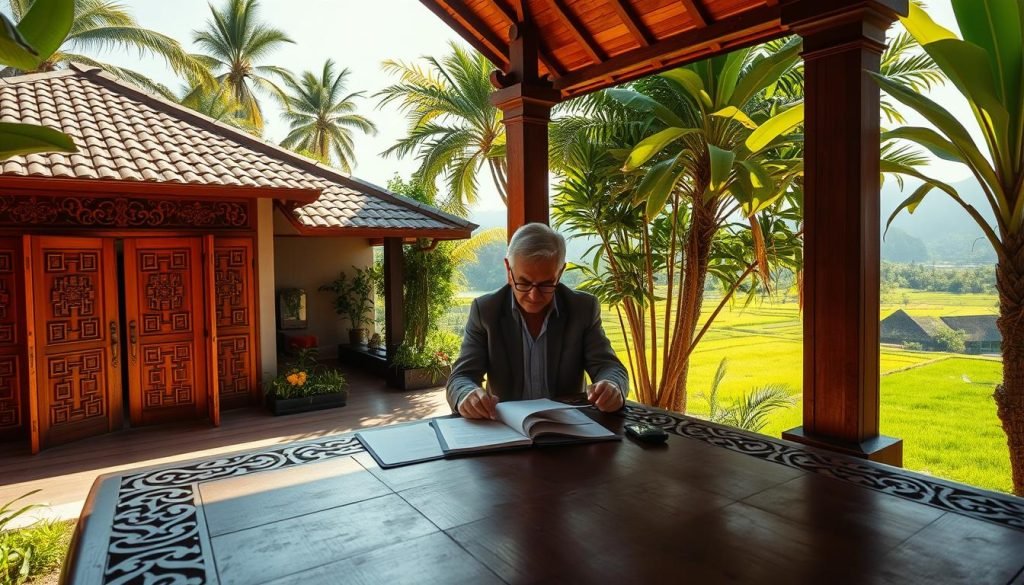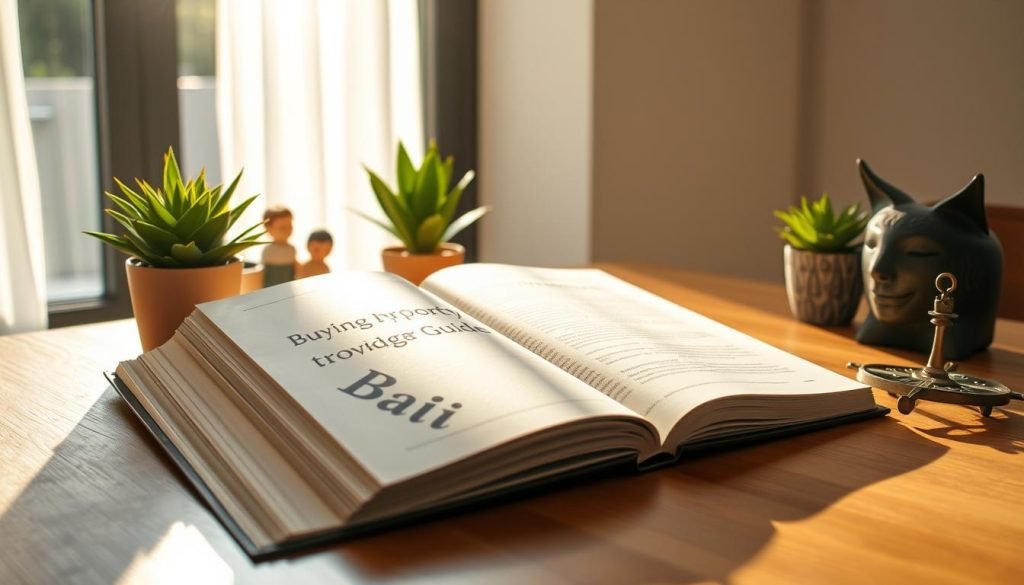How to Buy Property in Bali as a Foreigner: 2025 Guide

If you’re a foreigner wanting to invest in Indonesia’s property market, Bali is a great choice. The real estate here is booming. Experts predict the total transaction value will hit $62.7 billion by 2029.
But, buying property in Bali as a foreigner comes with legal hurdles. You must grasp the legal framework and the steps to buy property here. This guide will help you understand the key steps and rules to follow.
Key Takeaways
- Understand the legal framework for foreign property ownership in Indonesia
- Familiarize yourself with the process of buying property in Bali
- Be aware of the regulations and restrictions for foreign buyers
- Explore the growth prospects of the Indonesian property market
- Learn how to navigate the complexities of foreign property ownership
Understanding Property Ownership Laws for Foreigners in Bali
Indonesian property law offers ways for foreigners to own property in Bali. It’s key for them to know these laws well.
Indonesian Property Law Basics
Foreigners can’t own land in Indonesia directly. But, they can use legal ways to control or live in property. The main options are Hak Pakai (Right to Use) and Hak Guna Bangunan (Right to Build).
These rights let foreigners use property for a set time. They must follow certain rules and conditions.

Restrictions on Foreign Ownership
Foreigners face big restrictions in owning property. They can’t own land outright. They must choose from the allowed structures.
There are also limits on where and what kind of property foreigners can own. Knowing these rules is vital to avoid legal issues.
Recent Legal Changes for 2025
The laws for foreign property ownership in Bali are changing. By 2025, new rules will affect investors. It’s important for buyers to keep up with these changes.
Knowing about these updates helps foreigners buy property in Bali smoothly. Working with trusted legal experts is wise to follow the current laws.
Types of Property Ownership Structures Available to Foreigners
Bali’s property market offers various ownership structures for foreigners. Each has its own benefits and drawbacks. Knowing these is key when you want to buy property in Bali. It helps you choose the right option for your needs, whether for living or business.
Hak Pakai (Right to Use)
The Hak Pakai, or Right to Use, is a common choice for foreigners. It lets you use the land for 30 years, with renewal options. It’s great for those who want to live in the property.
Leasehold Agreements
Leasehold agreements are also popular. They let foreigners lease a property for 25 to 30 years, with renewal chances. This option balances control and flexibility.
- Long-term control over the property
- Flexibility in terms of lease duration
- Potential for lease renewal
Nominee Arrangements and Their Risks
Some consider nominee arrangements, where an Indonesian holds the property. But, this comes with big legal risks. It breaks Indonesian law and can lead to losing control over the property.
“Using nominee arrangements can expose foreigners to legal and financial risks, making it a less favorable option for property ownership in Bali.”
PT PMA (Foreign Investment Company)
For business or investment, a PT PMA (Foreign Investment Company) is a good choice. A PT PMA is a foreign-owned company that can legally own land and property. It’s strong for business operations.

Each ownership structure has its own benefits and fits different needs. Understanding the legal aspects and advantages of each helps you make a better choice when buying property in Bali.
Step-by-Step Process to Buy Property in Bali
To buy property in Bali, foreigners must follow a detailed process. This includes finding the right property, conducting due diligence, and finalizing the purchase. This guide will help you through the essential stages for a smooth transaction.
Finding the Right Property and Location
The first step is to find the right location and property type. Bali has many options, from beachfront villas to rural land. Think about the property’s location, zoning, and rental income if you plan to invest.
Researching the Local Market is key. Knowing market trends, prices, and demand helps you make a good choice. Local real estate agents can help find the perfect property.
Working with Reputable Agents and Lawyers
After finding a property, work with reputable agents and lawyers. Agents help at the start, while lawyers ensure legal aspects are correct.
Choose professionals familiar with foreign clients and Indonesian property law. They protect your rights and guide you through the process.
Due Diligence and Legal Checks
Due diligence is critical. It verifies the property’s legal status and checks for any issues that could affect ownership.
Verifying Land Certificates
Verifying the land certificate (Sertifikat Hak) is a key part of due diligence. Make sure it’s genuine and matches the property. Check the certificate’s details against the property’s physical characteristics.
Checking for Liens and Encumbrances
It’s also important to check for liens or encumbrances. These can include debts, legal disputes, or restrictions. A thorough check avoids future legal problems.
Negotiation and Payment Process
After due diligence, negotiate the purchase price and terms. Then, proceed with the payment process, usually through an escrow account.
Understanding the Payment Terms is vital. Know all costs, including taxes, fees, and notary charges. Your lawyer can explain the financial obligations and ensure a legal, secure transaction.
Costs and Considerations When You Buy Property in Bali
Foreign buyers should know the costs of owning property in Bali. It’s important to budget well to avoid surprises.
Purchase Taxes and Fees
Buying property in Bali comes with taxes and fees. These include transfer taxes and notary fees. The total can be 5% to 10% of the price, depending on the property and location.
Annual Property Taxes
Property taxes in Bali are lower than in many places. But, they’re part of your budget. The rate depends on the property’s value and type.
Maintenance and Management Costs
Keeping your property in Bali in good shape costs money. This includes management fees, repairs, and utility bills. Budgeting for these is key.
Currency Exchange Risks
As a foreign buyer, you face currency exchange risks. Rate changes can impact your property’s cost and expenses. Look into ways to manage these risks.
Insurance Requirements
Insurance is essential for property owners in Bali. You’ll need property, liability, and possibly earthquake insurance. Bali’s active volcanoes make this important.
| Cost Type | Description | Estimated Cost |
|---|---|---|
| Purchase Taxes and Fees | Taxes and fees associated with buying property | 5% to 10% of purchase price |
| Annual Property Taxes | Ongoing annual taxes on property ownership | Variable, based on property value |
| Maintenance and Management | Ongoing costs for property upkeep and management | 5% to 15% of property value annually |
Conclusion
Buying property in Bali as a foreigner can seem complex. But, with the right guide, you can handle the legal stuff and make a smart investment. Knowing the legal rules is key to a smooth deal.
Think about the different ways you can own property, like Hak Pakai or leasehold agreements. Pick what works best for you. It’s also important to work with trusted agents and lawyers. They help make sure you follow all the rules when buying in Bali.
By following this guide and understanding the costs and things to consider, you can make a good choice. Knowing the legal side helps you avoid problems and reach your goals in Bali.
FAQ
What are the types of property ownership available to foreigners in Bali?
Foreigners can own property in Bali in several ways. They can have Hak Pakai (Right to Use), leasehold agreements, or PT PMA (Foreign Investment Company). Each option has its own benefits and risks. The right choice depends on what the buyer wants.
What is the process of buying property in Bali as a foreigner?
Buying property in Bali involves several steps. First, find the right property. Then, work with trusted agents and lawyers. Next, do legal checks and complete the negotiation and payment.
It’s important to check land certificates and look for any liens or encumbrances. This ensures a smooth transaction.
What are the costs associated with buying and owning property in Bali?
Buying and owning property in Bali comes with costs. There are purchase taxes and fees, annual property taxes, and maintenance costs. Insurance is also required.
Foreign buyers should also consider currency exchange risks. Taking steps to manage these risks is important.
Can foreigners own property in Bali outright?
No, foreigners can’t own property in Bali outright. But, they can own it through certain structures. Hak Pakai gives the right to use the land. PT PMA allows foreigners to own property through a foreign investment company.
How do recent legal changes in 2025 affect foreign property buyers in Bali?
Legal changes in 2025 have brought new opportunities and challenges for foreign investors. It’s important to understand these changes. This knowledge helps foreign buyers navigate the Bali property market effectively.
What is the importance of due diligence when buying property in Bali?
Due diligence is key when buying property in Bali. It verifies the property’s ownership and checks for any liens or encumbrances. This ensures the property is free from legal issues.
This step helps avoid risks and makes the transaction successful.
How can foreigners mitigate currency exchange risks when buying property in Bali?
Foreigners can reduce currency exchange risks in several ways. They can use hedging strategies like forward contracts or options. This locks in exchange rates.
They can also use local currency accounts. This helps reduce exchange rate risks.









